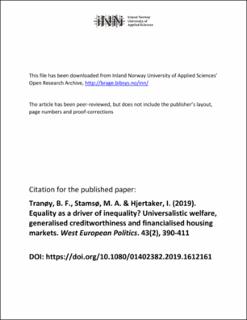Equality as a driver of inequality? Universalistic welfare, generalised creditworthiness and financialised housing markets
Peer reviewed, Journal article
Accepted version
Permanent lenke
https://hdl.handle.net/11250/2678045Utgivelsesdato
2019Metadata
Vis full innførselSamlinger
Originalversjon
10.1080/01402382.2019.1612161Sammendrag
Scandinavian countries are known for their universalistic welfare states, corporatist coordination, strong economic performances and egalitarian outcomes, an institutional combination often referred to as the “The Nordic Model”. However, these countries also possess volatile and increasingly vulnerable housing markets characterized by periods of sharp increases in prices and rents and some of the highest debt to income ratios in the world. The combination of a universalistic welfare state and housing market dynamics sets off a self-reinforcing process of increased stratification and re-familialisation. How did these orderly, egalitarian and welfare-oriented societies end up with housing markets that expose their citizens to increasing risk while driving inequality? The key lies in the effect the Nordic welfare state has on financialized housing markets. Successful decommodification of human lives leads to generalized creditworthiness which stimulates asset price inflation and new wealth and risk inequalities.
